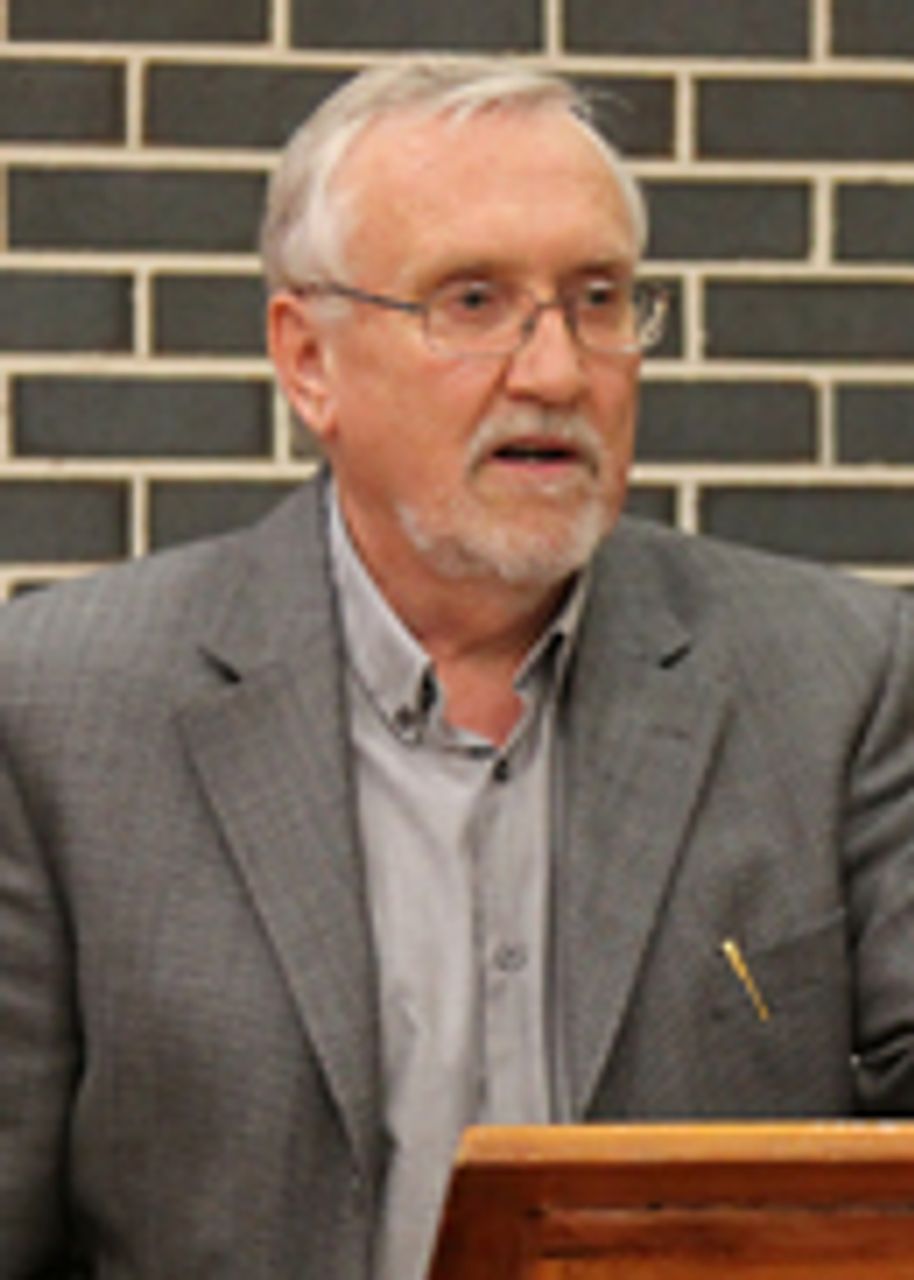The Socialist Equality Party held public meetings in Melbourne and Sydney last week to advance the demand for an immediate end to the US-led occupation of Afghanistan. The meetings were called following Labor Party Prime Minister Julia Gillard’s announcement in a parliamentary debate that Australian forces would be taking part in the war alongside American troops “until the end of the decade at least”.
 James Cogan
James CoganSEP national organiser James Cogan delivered the first report to both meetings. His remarks centred on exposing the lie that the war in Afghanistan was a “war on terrorism” and demonstrating its neo-colonial and imperialist character. He commented that while millions of people opposed the war, they were not conscious of the real motives for the US-led occupation and the immense implications for not only the people of Afghanistan, but the working class of the entire world.
Cogan reviewed the central themes of more than a decade of analysis by the International Committee of the Fourth International and the WSWS, contained in numerous statements and speeches on the World Socialist Web Site, beginning with “Why is NATO at war with Yugoslavia? World power, oil and gold” and “The war in Afghanistan and the crisis of political rule in America”.
The speaker displayed a map that showed the network of oil and gas pipelines criss-crossing Europe and Asia to demonstrate that the war was part of a reckless US imperialist agenda to control the exploitation of the vast oil and gas resources of the Middle East and Central Asia. The wars in Afghanistan and Iraq were part of a desperate attempt by the American capitalist class to reverse its long-term economic decline, he explained.
Cogan pointed out that the Australian ruling class and its political parties were well aware of the real US agenda. Successive governments, however, first Liberal, and now Labor, had supported US militarism for imperialist motives of their own. Since World War II, Australian imperialism had relied on US backing to retain a dominant position in the South Pacific and exert influence in South East Asia. The US alliance had become even more important in the eyes of major sections of the Australian ruling class as Chinese influence and power grew in the Asia-Pacific.
Cogan also exposed the lies of the Labor government that the war was bringing democracy to the Afghan people, by reviewing the character of Australian military operations and mafia-warlord types with whom Australian troops were collaborating in the southern province of Uruzgan. Australian special forces functioned as assassination death squads, killing alleged insurgents and terrorising Afghan communities. Australian “reconstruction” projects primarily benefitted the local power elite in Uruzgan, which had tribal connections with the Afghan President Hamid Karzai and was part of an utterly corrupt US puppet regime.
One of the main Australian allies in Uruzgan, Maitullah Khan, had a 1,700-strong private army, Cogan explained, and presided over a racket in which he received $US1, 300 for every truck allowed safe passage along the road between Kandahar and the Australian base at Tarin Kowt. A former diplomat told the New York Times last year that Khan had been the head of a “huge drug smuggling operation” between 2002 and 2006.
Bringing his remarks to a close, Cogan declared: “The war in Afghanistan is above all an attempt by American imperialism and its allies to shore up US global economic and political dominance at the expense of its rivals, of which Iran, Russia and China stand out as the primary targets. It is this that poses the working class of every country with vast dangers. Twice in the 20th century, the competition of rival capitalist powers for markets, resources, spheres of influence and profits ended in world war.”
The second report was delivered by Nick Beams, SEP national secretary and member of the WSWS international editorial board, to the Sydney meeting. It exposed the political agenda behind the Australian Greens’ alleged “opposition” to the Afghanistan war in the recent parliamentary debate.
The media and various pseudo-left organisations promote the Greens as “antiwar”, because they call for the phased withdrawal of Australian troops from Afghanistan.
 Nick Beams
Nick BeamsNick Beams noted that far from this being the case, Green leader Bob Brown and new Greens MP Adam Bandt had stressed in their parliamentary speeches that the Greens did not oppose imperialist military operations. Both had emphasised, for example, that the Greens had been at the forefront of calling for Australian troops to intervene in East Timor in 1999. While justified throughout the media and political establishment, including by the pseudo-left protest groups, as a humanitarian operation, the outcome of the Australian occupation of East Timor had been a newly established “independent” government bullied into leaving vast natural gas reserves in the Timor Sea under Australian control.
Beams pointed out that during the federal election Bob Brown had explicitly linked the Greens’ call for troops to leave Afghanistan with concerns over the military ties being developed between China and East Timor. Brown wrote that the “Greens’ strategy is to have our defence forces personnel at home to secure our own arc of stability”. There was no question, Beams stressed, that future neo-colonial Australian military operations in the Pacific region would enjoy the support of the Greens.
Beams explained that the positions advanced by the Greens were in line with the criticisms made of the Afghan war by factions of the ruling elite within both the US and Australia. These critics had highlighted the fact that while the US had been absorbed with the occupations of Afghanistan and Iraq, Chinese economic power, global political influence and military reach had been growing exponentially. Since 2001, Beams noted, China’s gross domestic product had nearly doubled, becoming the second largest in the world.
Beams drew attention to the fact that control over sources of energy supplies, as well as over the critical sea lanes used to transport the bulk of world trade, had emerged as areas of intense strategic rivalry between the US and China. He displayed a map of the Indian Ocean, highlighting potential flashpoints such as the Horn of Africa, the Straits of Hormuz in the Middle East and the Straits of Malacca in South East Asia, through which half of world trade passes.
The positions of the Greens, Beams made clear, reflected the nervousness of a section of the Australian ruling class over the rapidly changing geo-political situation. That is why they failed to make any mention, within the parliamentary debate, of the imperialist motives of the US in its occupation of Afghanistan or to condemn it as a criminal war of aggression. Instead, they used the debate to advance the views of figures like strategic analyst Hugh White, who has argued that Australian imperialism would be better served by putting a degree of distance between Canberra and Washington.
Beams noted that the dependence of Australian capitalism on China has enormously increased over the past decade. The percentage of Australian merchandise exports going to China has grown from just 5.3 percent in 2000 to over 23 percent, compared with barely 5 percent to the United States. China was now Australia’s largest trading partner and, along with Japan, South Korea and India, accounted for 58 percent of all Australian exports. The dilemma facing the Australian capitalist class was whether it continued with its close postwar geo-strategic alignment with the United States—the stance of the Labor government—or shifted toward closer relations with its main economic partners in Asia.
Concluding his presentation, Beams stressed that the only way that the threat of inter-imperialist war could be successfully opposed was through the struggle for the socialist and internationalist perspective of the International Committee of the Fourth International and the Socialist Equality Party.
Following the reports, audience members asked a series of questions about the rivalry over pipelines in Central Asia; the strategic conflicts taking place in the Asia-Pacific; and the activities of Australian forces in Afghanistan. Workers and young people donated generously to the SEP monthly fund and purchased a variety of literature, including books, magazines and pamphlets containing some of the seminal analysis of the WSWS on the US-led wars in Afghanistan and Iraq.
* * * *
The WSWS interviewed participants at the two meetings. In Sydney, Mark, a university mathematics researcher, said he had learned a lot from the presentations. “It was good to get a global picture behind the occupation of Afghanistan. I was impressed by the clarity of the global analysis. It reinforces my feeling that this war can’t go on.”
Asked about the role of the Greens in the parliamentary debate on the war, Mark said he had not recognised their duplicity. “I was more congenial to the Greens. I have been against the major parties for a long time, but I had not studied the positions of the Greens. Their stance is nationalist.”
 Shane
ShaneShane, a clerical worker in Melbourne, said: “The meeting was quite clear in showing that involvement in the war in Afghanistan is driven by one, the alliance with the US, and two, capitalist nations vying with each other over resources. They see these resources as possessions to be gained.
“I think it became quite obvious from the answer to one of the questions that was asked that it is now time for us, the working class, to take action rather than allowing capitalism to go on doing this.
“The perception of the Greens is that they are left wing, but they are not. Australia’s involvement is effectively to prop up a puppet regime in Afghanistan on behalf of US imperialism. If the Greens are not pointing that out, then why?
“If you are for the working class, then you are for the working class internationally. If in any shape or form they [the Greens] are excusing militarism, then they are excusing the reason for militarism itself. If they say we can move out of Afghanistan and focus on the rim around Australia, it is still pro-militarism. They are supporting the reason why militarism exists in the first place and that goes back to the analysis of capitalist nations fighting over resources and profits.”
